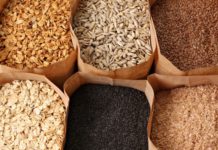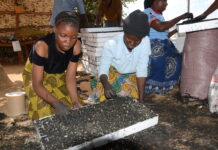- What inspired you to establish FarmERP and focus on digitising agriculture?
The inspiration to establish FarmERP and concentrate on digitizing agriculture, along with Santosh Shinde, stemmed from the inherent volatility of the agricultural sector. We established FarmERP with a distinct mission to usher agriculture into the digital age. Our objective is to leverage technology to enhance predictability within farming practices. By doing so, we aspire to empower farmers to increase their yields and income. Our ultimate goal is to mitigate uncertainties and foster greater stability within the realm of agriculture through our innovative digital solutions.
- Could you provide insights into the journey of FarmERP since its inception, an overview of the products and smart AgriTech solutions it offers?
FarmERP’s journey since its inception has been marked by remarkable growth and innovation, establishing itself as a global leader in digital farming solutions. Our primary goal has always been to provide comprehensive digital solutions to the agriculture industry.
Over the years, we have developed a diverse range of smart and scalable digital solutions that cover the entire agriculture value chain. These encompass farming, procurement, processing, supply chain management, financial oversight, and data-driven analytics. These solutions enable stakeholders to embrace Digital Agriculture 4.0, fostering profitable and sustainable agribusiness practices.
To ensure a seamless user experience, we have integrated various cutting-edge technologies, including sensors, Internet of Agricultural Things (IoAT) devices, GIS, drones, mobility, big data, and legacy systems. Additionally, our platform leverages Artificial Intelligence, Machine Learning, Computer Vision, satellite imagery, and statistical modeling as the foundation for our Climate Smart Advisory services.
- In what ways does FarmERP contribute to the transformation of agriculture and agribusiness through its array of products and smart AgriTech solutions?
Leveraging our exceptional research and development capabilities and nearly two decades of professional expertise, FarmERP has been instrumental in assisting numerous prominent companies in achieving profitable and sustainable agricultural objectives. Our commitment lies in enhancing the overall efficiency of farming operations while advocating for ‘regenerative agriculture’ to become the prevailing practice. FarmERP plays a pivotal role in automating and optimizing farming enterprises, catering to mid to large-scale farms, export houses, and contract farming firms on a global scale.
- How does the ClimateTech plays a Vital Role in Advancing Agriculture – Mitigating Risks and Boosting the productivity of Farming Business
ClimateTech significantly aids agricultural practices by mitigating climate change risks. FarmERP employs this technology to optimize the use of water, nutrition, fertilizers, and pesticides. Our expertise lies in providing high-end and customized advisory for irrigation, nutrition, and crop health. For example, FarmERP addresses challenges faced in water-scarce regions like the Middle East and Gulf countries. This innovative approach has notably assisted agricultural businesses in the UAE, Oman, Saudi Arabia, Qatar, Egypt, and Jordan, offering custom solutions to combat unique climatic hurdles.
- Does FarmERP’s digital technology hold the potential for GHG reporting or carbon reporting in agriculture, fostering sustainability efforts in the field?
FarmERP’s digital technology has immense potential for GHG and carbon reporting in agriculture, bolstering sustainability efforts in the field. The platform collects extensive data throughout the entire farming cycle, from seeding to crop sales, crucial for such reporting. It quantifies carbon emissions derived from various farming activities, including fuel usage in machinery, fertilizers, and chemicals. FarmERP optimizes these aspects, promoting eco-friendly and sustainable farming practices. By leveraging the data collected, it showcases the reduction in carbon emissions achieved. Furthermore, it offers valuable insights, on carbon sequestration contributing significantly to sustainability efforts.
- Can you explain how the use of new-age technologies like AI and IoT enhances the functionality of FarmERP’s platform?
FarmERP’s FarmGyan platform harnesses AI and IoT to enhance its functionality, revolutionizing agricultural practices. Utilizing FarmGyan’s technology, AgriBusinesses can detect pests, diseases, and assess crop quality through AI and IoT analysis using a simple cellphone camera. Another offering which is plant counting via drone imagery identifies areas where plants might have perished and also determines the crop health. Moreover, it facilitates grading of produced crops based on quality metrics. The platform streamlines labour management, automatically tracking daily attendance using cellphone cameras and enabling wage calculation. Notably, these features operate offline, ensuring accessibility in remote areas. FarmGyan’s algorithms dynamically adjust irrigation and fertilizer needs according to real-time weather conditions, optimizing farming processes with standard advisory, ensuring efficient resource usage.
- What all language does FarmERP’s software supports also shed some light on your flagship product FarmGyan
FarmERP supports 8 languages including English, Spanish, French, Russian, Vietnamese, Turkish, Thai, Arabic languages on its app. The addition of Spanish and French languages was aimed at eliminating accessibility barriers to information and expanding the platform’s outreach to other countries. Now, European and West African users can access the platform’s comprehensive features and resources in their native languages.
In January 2022, FarmERP introduced its intelligent agriculture advisory platform, FarmGyan. FarmGyan is an AI-driven advisory service designed to assist with tasks such as pest and disease detection, quality assurance and more. FarmERP has initially implemented FarmGyan for cassava plantations in Nigeria and plans to extend its use to Thailand, Indonesia, Angola, and Ghana. This expansion aims to support cassava farmers by prolonging the lifespan of their crops through the utilization of AI, machine learning, computer vision-based operating systems, and deep learning techniques.
- Tell us about the total numbers of crops does the software of FarmERP supports also brief the readers about the Cassava campaign by FarmERP
FarmERP supports more than 170 crops including vegetable crops, fruit crops, spice crops, flower crops, cereals & pulses, plantation crops, oilseeds and cash crops. In the recent cassava campaign conducted, FarmERP placed a significant emphasis on supporting cassava plantations. FarmERP successfully decreased costs by 40 to 50% attributed to cassava plant mortality. The primary goal of the campaign was to unleash the full potential of cassava plantations for businesses, with a focus on enhancing productivity, profitability, and predictability. This successful initiative was initially implemented in Nigeria and is now poised for expansion to other regions, including Thailand, Indonesia, Angola, and Ghana. FarmERP’s dedication to improving cassava farming outcomes underscores its commitment to empowering farmers and promoting sustainable agriculture.








